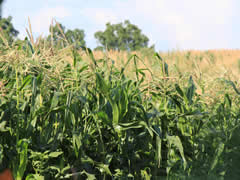Industrial Agriculture vs. Organic Farming:
Better Living through Chemistry?
By Joshua Coates

It doesn’t stop there. According to Koch, “more transgenic foods are on the way. Scientists are rapidly ‘inventing’ other new foods, including at least 21 modified fish varieties. They are also studying inserting animal and human genes into plants and animals.” By now many of us are familiar with the story of “Flav’r Sav’r” tomatoes. These are tomatoes that are spliced with the genes of flounder fish so they resist the cold and produce longer growing seasons. This may initially seem beneficial; however, what might the ramifications be for ingesting these hybrid crops?

So much testing still needs to be done, and yet agribusiness keeps rolling out one after another of these potentially dangerous and unstable creations. Kimbrell notes, “By failing to require testing and labeling of genetically engineered foods, the FDA has made millions of American consumers unknowing guinea pigs for potentially harmful, unregulated food substances.”
There is an ever-flowing litany of self-praise from industrial farming advocates, to fight increasing public awareness of the dangers inherent in pesticide use and genetic engineering. Gregory Conko, in his article “The Rush to Condemn Genetically Modified Crops”, insists “[genetically modified crops are] helping farmers to increase yields, reduce pesticide spraying, and save topsoil—and without injury to a single person or damage to an ecosystem.” This optimistic view is prevalent in pro-industrial propaganda, but it is being challenged by ever-increasing evidence brought to light.
An example of this evidence: according to the Center for Disease Control, there are over 53 pesticides described as carcinogenic that are regularly found in the food we eat. Carcinogenic means CANCER CAUSING. Organic farming is essentially growing food without the use of industrial chemical fertilizers and pesticides. Industrial farms use so much pesticide that the pests they target (and countless native plants) often die off completely. While that may sound good, the truth is that everything in an ecosystem is closely intertwined, and the loss of one species can have catastrophic consequences for all others.

Industrial farms use harsh chemical herbicides to kill weeds. Now, more often than not, they grow genetically modified versions of crops that will not die when sprayed with the herbicide that they also manufacture. The herbicide is applied and everything in its path dies or is seriously harmed, except the plants genetically modified to survive…this means weeds, wild races of food, and any non-modified crops. This also sometimes means animals, birds, and migrant farm workers.
The rise of industrial agriculture has been shadowed by a similar rise in food-borne illness, due to industrial packaging and processing policies and procedures. In a year, food-borne illnesses kill 9,000 people in the US alone. Antibiotics fed to livestock can breed pathogens that are antibiotic-resistant and can confer the resistance to bacteria present in our bodies; antibiotic resistance is a major killer in the US.
Industrial agriculture claims to make better use of land, thus saving wilderness from being destroyed by low-yield small farmer operations. Miller recounts the words of Dr. Norman Borlaug, 1970 Nobel Peace Prize laureate and father of the Green Revolution: "Growing more crops and trees per acre leaves more land for nature…we cannot choose between feeding malnourished children and saving endangered wild species. Sustainably higher yields of crops and trees are the only visible way to save both.” This sounds hopeful, and there are many others that echo this sentiment.

In her essay, "Genetically Modified Foods Provide Safe and Healthy Choices for Consumers,” Judeen Bartos explains that “the use of GM technology can help in reducing the carbon footprint and environmental impact of farming in a number of ways. GM crops can help decrease the need for plowing, helping farmers adopt less intensive agricultural methods and so further reducing the carbon footprint of the food chain. GM crops are being developed that require 50% less fertilizer, a major part of the carbon footprint of a crop.” These statistics are part of the promises of industrial agriculture that technology will save us and the planet, that genetically modified crops coupled with chemical fertilizers are going to be the solution to a myriad of problems faced by humanity.
Biotechnology offers us the hope of not needing pesticides because now many plants are being genetically engineered to repel insects. These pesticidal plants will be toxic to bugs…and then become our food. Because of their relative newness, the long term effects of these crops on human health and the environment cannot possibly be known. These crops are being grown, distributed, and eaten as you read this. These crops are not labeled as to their genetic modifications or the chemicals used in their production because the law does not require it. How can you, as a consumer, make the best choices when filling your grocery cart if you don’t have all the facts necessary to make an informed decision? Industrial farming professes to have the ability to save the planet from the destruction of woodlands by organic farmers, but is organic farming really what we need saving from?
Did you like the article? Subscribe here to our New Article Email Alert or RSS feeds.
Sharing is caring! Don't forget to share the love, and keep the conversation going by leaving a comment below:
Advertisement
